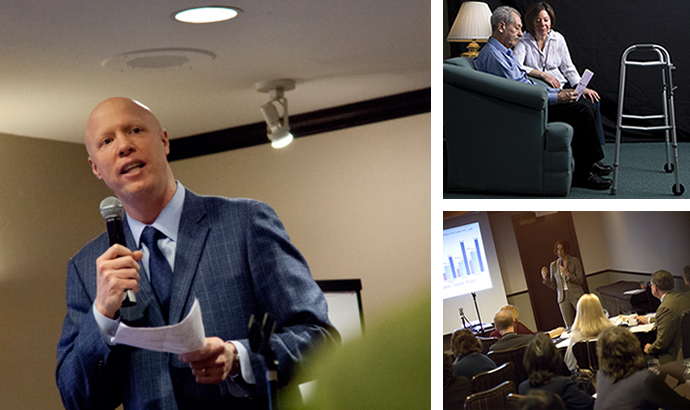Eric A. Coleman, MD, MPH
Leading Change
For nearly 15 years, Dr. Coleman has shown remarkable leadership in helping guide and
grow some of the Hartford Foundation’s most innovative aging initiatives. He currently serves as professor of medicine and head of the Division of Health Care Policy and Research at the University of Colorado Denver Anschutz Medical Campus. Formerly the leader of the Hartford Geriatrics Health Outcomes Research Scholars program, he is also director of the Care Transitions Program and executive director of the Practice Change Leaders Program. Dr. Coleman received a MacArthur Fellowship in 2012 for his care transitions work.

(Left) Beeson Scholar, Robert Wood Johnson Clinical Scholar and MacArthur Genius awardee, Eric Coleman, MD, MPH, serves as Principal Investigator for the Care Transitions Intervention and director of the Practice Change Leaders program.
(Right, top) As life expectancy increases, healthcare providers must support the growing numbers of medically complex patients, often with multiple chronic conditions.
(Right, bottom) Participants at a 2013 Practice Change Leaders for Aging and Health conference designed to develop, support and expand the influence of organizational leaders committed to improving the way health care is delivered to older adults.
In addition to his Care Transitions Intervention (Transitioning to Reduce Readmissions and Lower Medicare Costs), Dr. Coleman has led the Practice Change Fellows Program, the origin of which traces directly to the HMO Care Management Work Group. Both Dr. Coleman and Nancy A. Whitelaw, PhD, were active participants in the Work Group and were able to successfully recruit other participants to form the National Advisory Board for the Practice Change Fellows Program. The group, with funding from the Robert Wood Johnson Foundation, produced best-practices reports, but more importantly, created a supportive peer group for senior professionals.
The Foundation knew of the work and saw an opportunity in it to identify people earlier in their career for whom such a model could be helpful. “Hartford realized that if you invest in people, the returns continue on forever,” Dr. Coleman says. The idea resulted in the Fellows Program, funded both by the Hartford Foundation and The Atlantic Philanthropies, which offered mentorship in the form of pods—discrete interdisciplinary groups of professionals who could share ideas, advice, and experience.
As the Practice Change program began to wind down, Medicare decided to use it as a model for its new CMS Innovation Advisors Program (IAP). Hartford and Atlantic subsequently funded training in older adult care for graduates of the CMS program, which they called Practice Change Leaders.
After the first cohort graduated, Medicare discontinued IAP, but that wasn’t the end of the story. “Hartford, Atlantic, and our program had built in contingency plans,” says Dr. Coleman. “So now we can go forward and recruit people who have had comparable leadership experience. This will allow our alumni to continue in both the work they have been doing and in new, innovative projects.”